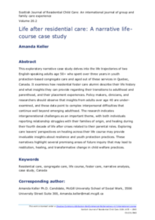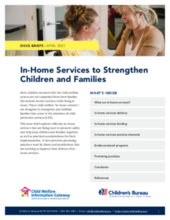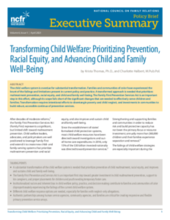Displaying 321 - 330 of 2221
This study examines the benefits of subsidized housing with supportive services compared to subsidized housing alone.
The purpose of this study was to provide a population-based analysis of child protection system (CPS) involvement among children and adolescents who died by suicide.
This exploratory narrative case study delves into the life trajectories of two English-speaking adults age 50+ who spent over three years in youth protection-based congregate care and aged out of these services in Quebec, Canada.
Most children involved with the child welfare system are not separated from their families but instead receive services while living at home. This issue brief explores effective in-home services that are being used to promote safety and help keep children and families together, as well as practical considerations for their implementation. It then presents promising practices used by States and jurisdictions that are working to improve their delivery of in-home services.
This policy brief presents a list of recommendations for U.S. policymakers to transform the child welfare system by prioritizing maltreatment prevention, racial equity, and child and family well-being.
This study experimentally tested proximal outcomes of Connecting, a low-cost, self-directed, family-based substance-use prevention program for foster families.
The current study used population-based administrative records from California to assess how CPS responds to reported allegations of IPV, with and without physical abuse and/or neglect allegations.
According to this article, a local group in Washington state in the U.S. is "advocating for a state bill, passed by the House in early March, that would tighten the criteria for taking a child from a home at the first stages of a case before a full fact-finding hearing before a judge."
According to this article from Forbes, two U.S. senators have reintroduced a family leave law called the Family and Medical Insurance Leave Act (FAMILY Act).
The purpose of this study was to examine associations of foster care exit type (e.g., reunification with birth family, adoption, guardianship/permanent relative placement, or emancipation from care) with risk of entry into state prison in the U.S. state of Wisconsin and to examine racial disparities in those associations.



